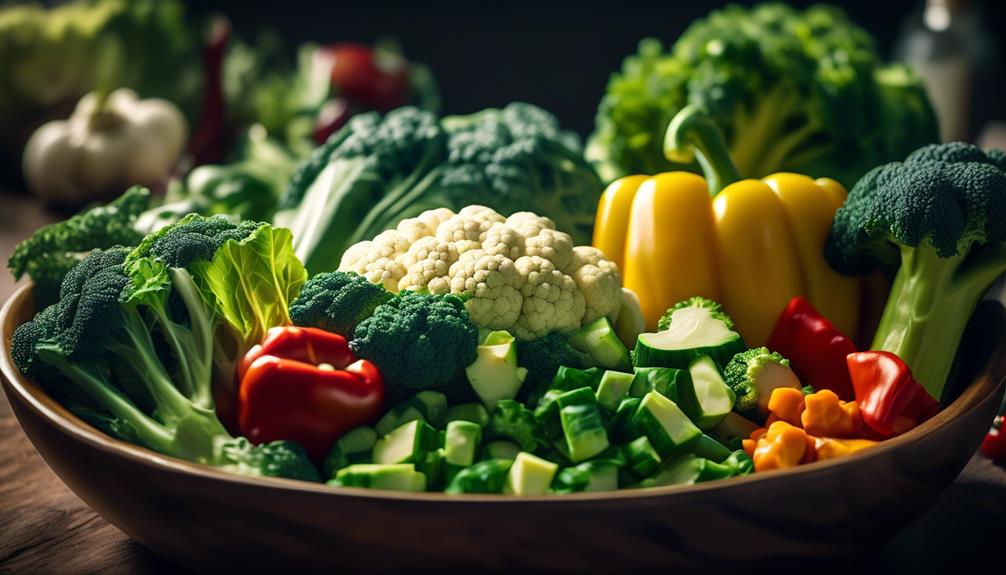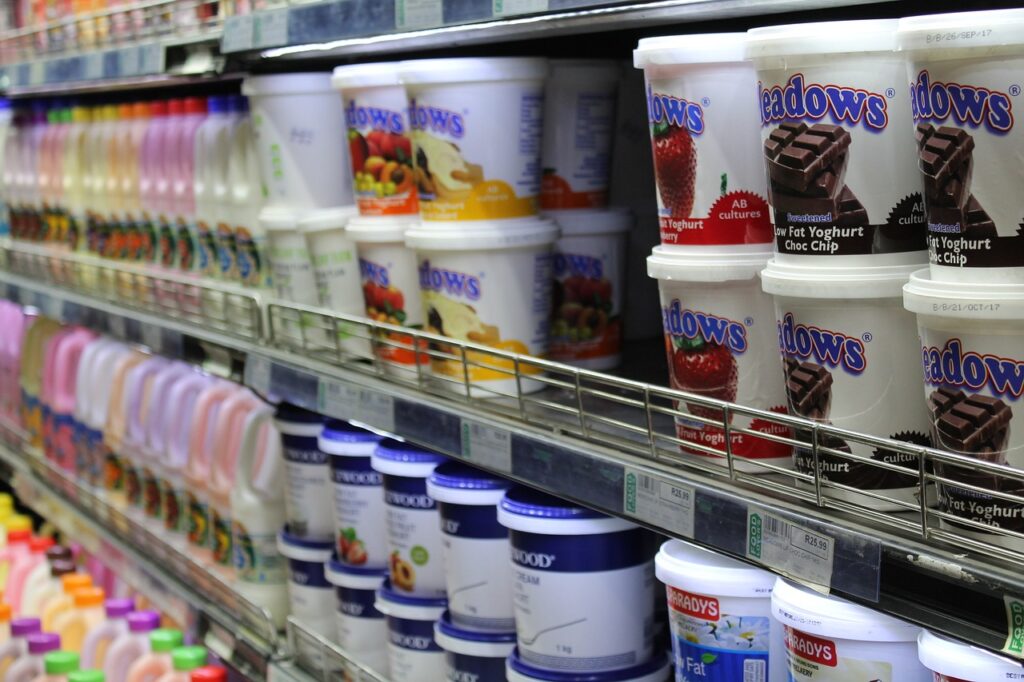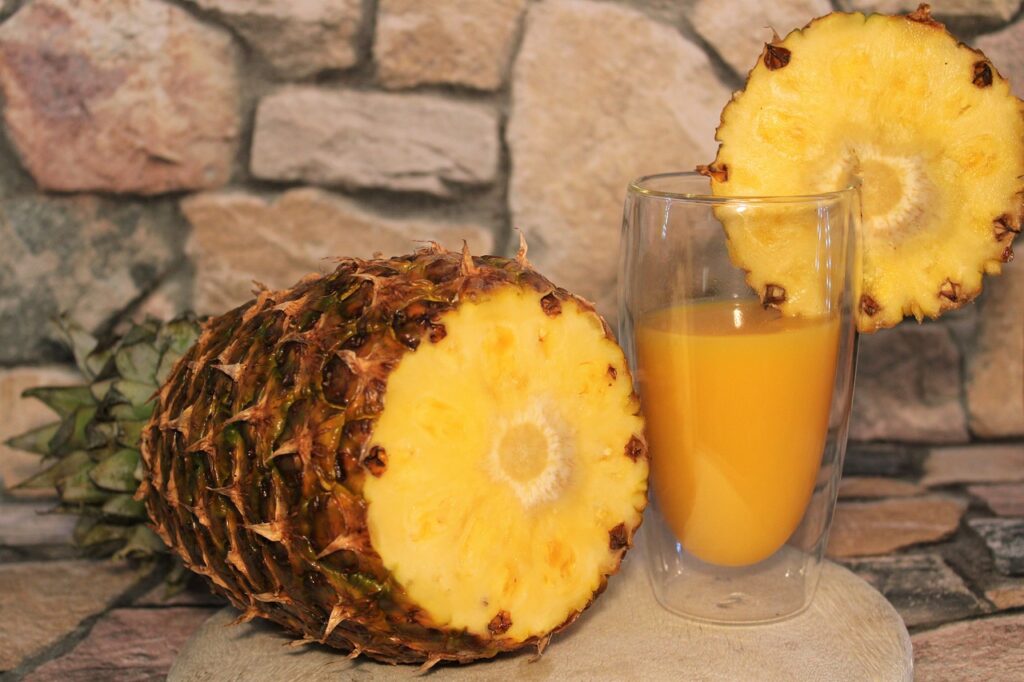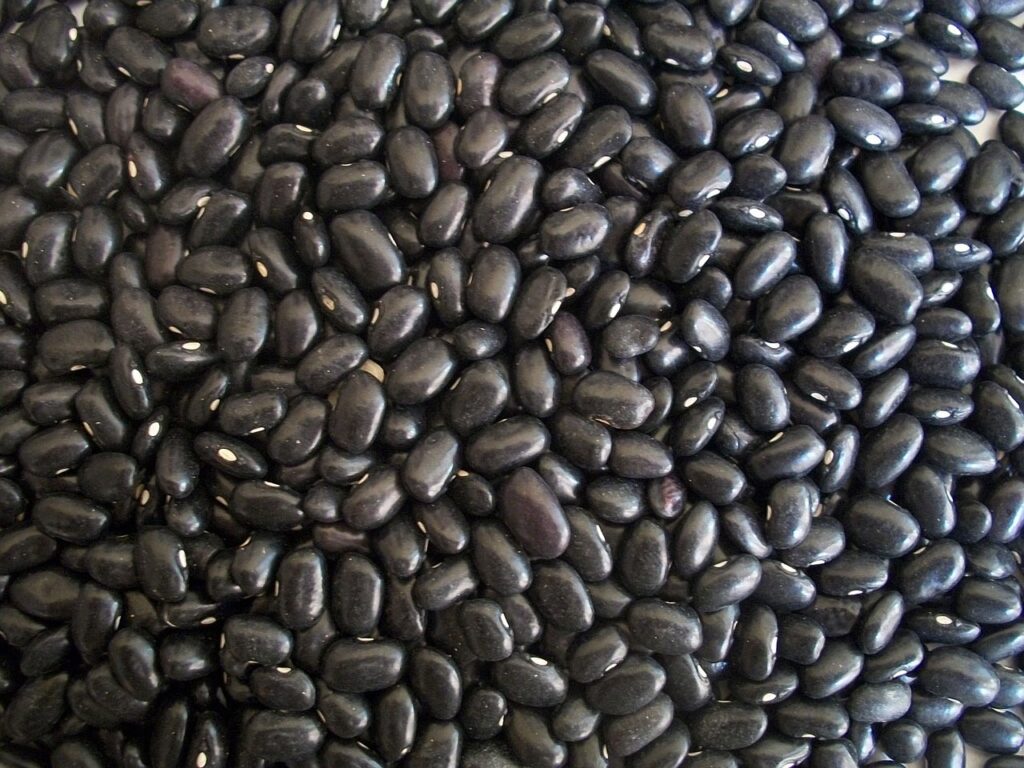Did you know that not all vegetables are created equal when it comes to a dairy-free keto diet? While you may be familiar with the concept of low-carb vegetables, there are some specific ones that are particularly suitable for those following a dairy-free keto lifestyle.
Whether you're looking for leafy greens or above-ground options, there are plenty of choices to help you stay on track. But which ones are the best?
In this discussion, we will explore the top low-carb vegetables for dairy-free keto, revealing some surprising options that can add variety and flavor to your meals while keeping your carb intake in check.
So, let's dive in and discover the power of these nutrient-packed veggies that will support your dairy-free keto journey.
Spinach

Spinach, a nutrient-dense leafy green, is a versatile low-carb vegetable that can be easily incorporated into your dairy-free keto diet. With just 1 gram of carbs per cup, spinach is an excellent choice for those following a low carb diet. It can be enjoyed in a variety of dishes such as omelets, soups, salads, and sautéed side dishes.
Not only is spinach low in carbs, but it's also rich in essential nutrients. It's a great source of iron, calcium, magnesium, potassium, vitamins, folate, fiber, and antioxidants. These nutrients are important for overall health and well-being.
One particular antioxidant found in spinach is alpha-lipoic acid, which has been shown to reduce symptoms of metabolism-related diseases and diabetic neuropathy. This makes spinach a valuable addition to a dairy-free keto diet, as it provides important vitamins, minerals, and antioxidants with minimal impact on carb intake.
Kale
Now let's turn our attention to another nutrient-dense leafy green that's perfect for your dairy-free keto diet: kale. This low-carb vegetable offers a range of health benefits and can be incorporated into your meals in various ways.
Here are four reasons why kale is a great addition to your dairy-free keto meal plan:
- Low in carbs: With less than 1 gram of carbs per cup, kale is an excellent choice for those following a low-carb diet. It has minimal impact on blood sugar levels, making it ideal for maintaining ketosis.
- Nutrient-packed: Kale is packed with essential vitamins and minerals, including vitamins A, C, and K, as well as calcium and potassium. These nutrients are vital for overall health and can support your body's functions while on a keto diet.
- Versatile ingredient: You can enjoy kale in numerous ways, from adding it to salads and soups to sautéing it as a side dish. You can even make crunchy kale chips for a satisfying snack. Its versatility allows you to incorporate it into various meals and enjoy its health benefits.
- High in antioxidants: Kale is rich in antioxidants, including beta-carotene and flavonoids. These compounds help protect your cells from damage caused by free radicals and support overall health.
Incorporating kale into your dairy-free keto diet not only adds a burst of flavor and texture to your meals but also provides you with valuable nutrients and health benefits.
Cauliflower

Looking for a versatile and nutritious vegetable to incorporate into your dairy-free keto diet? Look no further than cauliflower. This low-carb vegetable is an excellent choice for those following low-carb diets, with just 3 grams of net carbs per serving. Not only is cauliflower low in carbs, but it's also packed with vitamins K and C, making it a nutritious addition to your meals.
One of the great things about cauliflower is its versatility. It can be used as a substitute for higher carb foods, such as rice or mashed potatoes. You can enjoy cauliflower in various ways, whether it's roasted, steamed, or even mashed. It can even be transformed into cauliflower steak, a delicious and satisfying alternative to traditional meat-based dishes.
In addition to its low carb content, cauliflower is also dairy-free, making it a suitable option for those with dairy intolerances or following a dairy-free keto diet. So whether you're looking to reduce your carb intake or eliminate dairy from your diet, cauliflower offers a great solution. It not only adds variety and flavor to your meals but also provides you with the essential nutrients your body needs.
Zucchini
Cauliflower isn't the only low-carb vegetable that can be enjoyed on a dairy-free keto diet; another versatile option is zucchini. Zucchini is a nutritious and delicious choice for those following a dairy-free keto diet. Here are some facts about zucchini that make it an excellent addition to your personalized meal plan:
- Zucchini is low in carbs, with just under 5 grams of net carbs per cooked cup. This makes it a great choice for those watching their carb intake on a dairy-free keto diet.
- Despite its low carb content, zucchini is packed with essential nutrients. It's high in vitamin C, potassium, folate, and fiber, which are all important for maintaining good health.
- Zucchini has a minimal impact on blood sugar due to its low glycemic load of 1. This means it won't cause a sharp spike in blood sugar levels, making it a suitable choice for those with diabetes or those looking to maintain stable blood sugar levels.
- Zucchini is incredibly versatile and can be used in a variety of dairy-free keto recipes. From zucchini noodles in place of pasta to grilled zucchini as a side dish, the possibilities are endless.
Incorporating zucchini into your dairy-free keto diet not only adds a healthy dose of nutrients but also brings flavor and variety to your meals. So go ahead and explore the delicious world of zucchini!
Artichokes

Artichokes offer numerous nutritional benefits, making them a great option for those following a dairy-free keto lifestyle. High in fiber and prebiotics, artichokes can promote heart and gut health.
With their versatility in cooking methods and recipe ideas, you can easily incorporate artichokes into your low-carb, dairy-free keto meals.
Nutritional Benefits
With their high fiber content and abundance of antioxidants, artichokes offer numerous nutritional benefits that make them an excellent addition to a dairy-free keto diet. Here are some reasons why you should consider incorporating artichokes into your meals:
- Fiber: Artichokes are high in fiber, which is essential for maintaining a healthy digestive system and promoting good gut health.
- Prebiotics: They're a good source of prebiotics, which nourish the beneficial bacteria in your gut, supporting a healthy microbiome.
- Antioxidants: Artichokes are rich in antioxidants like quercetin and rutin, which help protect your cells from inflammation and oxidative stress.
- Low in net carbs: With their low net carb content, artichokes are a suitable choice for a low-carb or keto diet.
You can enjoy artichokes in various delicious recipes, such as dips, salads, or stuffed artichoke hearts. Consider cooking them with healthy oils like olive oil, coconut oil, or avocado oil to enhance their flavor and nutritional value.
Cooking Methods
When it comes to cooking artichokes, there are several methods that can be used to bring out their unique flavor and tenderness.
Boiling is one option, where you trim the tops and remove the tough outer leaves before cooking them in salted water until they become tender.
Steaming is another popular method, where the artichokes are placed in a steamer basket over boiling water until the leaves easily pull away.
If you prefer a richer flavor, you can roast the artichokes by brushing them with oil, seasoning with herbs, and baking until they become tender and slightly caramelized.
To enhance the taste, consider grilling the artichokes after boiling or steaming them for a smoky flavor.
These cooking methods ensure that artichokes remain low in carbs and suitable for dairy-free keto recipes.
Recipe Ideas
For a delicious and satisfying addition to your dairy-free keto recipes, consider incorporating the versatile and nutritious artichoke into dips, salads, or as a flavorful side dish. Artichokes are a great source of fiber, making them a filling and satisfying addition to dairy-free keto recipes.
Here are some recipe ideas to inspire you:
- Smashed Artichokes with Lemon-Dill Aioli: This recipe combines the creaminess of smashed artichokes with a tangy and flavorful dairy-free aioli.
- Artichoke and Spinach Dip: A classic favorite, this dairy-free version uses oil-based mayonnaise and nutritional yeast for a cheesy flavor.
- Grilled Artichoke Salad: Toss grilled artichoke hearts with fresh greens, cherry tomatoes, and a vinaigrette made with oil, lemon juice, and herbs.
- Artichoke and Sausage Stuffed Peppers: Combine artichoke hearts, cooked sausage, and spices, then stuff the mixture into bell peppers and bake until tender.
Incorporating artichokes into your weekly Diet Doctor keto breakfast or as a side dish can add variety and nutrients to your dairy-free keto diet. Artichokes are rich in vitamins C and K, and their high fiber content can support a healthy gut and heart.
Enjoy the versatility of this low-carb vegetable in your dairy-free keto recipes.
Broccoli

Broccoli is a nutritional powerhouse, offering a range of vitamins and minerals that are beneficial for a dairy-free keto diet. With its low-carb content of just 6 grams per cup, broccoli is a suitable option for those looking to reduce their carbohydrate intake.
There are numerous delicious ways to enjoy broccoli, such as in salads, stir-fries, or roasted with olive oil and garlic, making it an easy and versatile addition to your dairy-free keto meals.
Nutritional Benefits of Broccoli
Enhance your low-carb, dairy-free diet with the nutrient-packed goodness of broccoli. This versatile vegetable offers a range of nutritional benefits that make it an excellent choice for those following low-carb diets, including dairy-free keto.
Here are some reasons why you should consider adding raw broccoli to your meals:
- High in fiber: Broccoli is a fiber powerhouse, with 1 cup of raw and chopped broccoli containing 6 grams of fiber. Fiber is essential for digestive health and can help you feel fuller for longer.
- Rich in vitamins and minerals: Broccoli is packed with vitamins C and K, folate, and potassium. These nutrients support immune function, bone health, and overall wellbeing.
- Anti-diabetes effects: As a member of the brassica family, broccoli has been shown to have anti-diabetes effects. It can help regulate blood sugar levels and improve insulin sensitivity.
- Versatile preparation options: Whether you enjoy it steamed, roasted, or added to stir-fries, broccoli can be incorporated into various dishes to add flavor, texture, and nutritional value to your meals.
Incorporating broccoli into your low-carb, dairy-free keto diet can provide you with a range of nutritional benefits, including high fiber content, essential vitamins and minerals, anti-diabetes effects, and versatile preparation options.
Delicious Ways to Prepare Broccoli
To explore the delicious ways to prepare broccoli, you can get creative with different cooking methods and flavors, adding a nutritious and flavorful twist to this versatile vegetable.
One tasty option is to roast broccoli in the oven with olive oil and garlic. This brings out a rich, caramelized flavor that pairs well with many dishes.
Another idea is to use broccoli in a cauliflower steak recipe, where the florets are sliced thickly and grilled or roasted until tender.
Additionally, you can enjoy broccoli by dipping it in a tangy Chipotle Ranch Dressing for a zesty kick.
For a dairy-free keto breakfast, try making Keto avocado eggs with bacon sails and include broccoli as a nutritious side.
Experiment with these cooking methods to find your favorite way to prepare broccoli and elevate your low-carb vegetable dishes.
Asparagus
Incorporating asparagus into your dairy-free keto meals can provide a versatile and delicious option that's low in carbohydrates and high in fiber. Here are some facts about asparagus and why it's a great addition to your diet:
- Asparagus is a low-carb vegetable that has a low glycemic load and minimal impact on blood sugar levels. This makes it an excellent choice for those following a ketogenic diet.
- It's a good source of fiber, with nearly half of its carbohydrates coming from fiber. This can help improve digestion and promote feelings of fullness, which is beneficial for weight management.
- Asparagus can be enjoyed with a delicious cheese topping to enhance its taste, while still maintaining a low-carb and dairy-free profile. This allows you to add variety to your meals while staying within the guidelines of a dairy-free keto diet.
- Asparagus can be prepared in various ways, such as roasting, grilling, or sautéing. This versatility allows you to incorporate it into a wide range of dairy-free keto recipes, adding both flavor and nutritional benefits.
Brussels Sprouts

Brussels sprouts offer numerous health benefits and can be a delicious addition to your dairy-free keto diet. These low-carb vegetables are packed with fiber, providing essential nutrients while keeping your carb intake in check.
Whether you roast or steam them, Brussels sprouts can be a versatile ingredient in stir-fries, salads, or roasted dishes, adding both flavor and nutrition to your meals.
Health Benefits of Brussels Sprouts
With their low carb content and high fiber, Brussels sprouts offer numerous health benefits that can support your low-carb and dairy-free lifestyle. These cruciferous vegetables aren't only delicious but also packed with nutrients that are beneficial for your overall health.
Here are some of the health benefits of Brussels sprouts:
- Low in carbs: Brussels sprouts are an ideal choice for a low-carb diet, as they contain less than 8 grams of carbs per cup. This makes them a great option for those following a dairy-free keto lifestyle.
- High in fiber: With almost 4 grams of fiber per cup, Brussels sprouts are a fantastic source of dietary fiber. This can help promote healthy digestion, manage blood sugar levels, and support weight management.
- Rich in vitamins and minerals: Brussels sprouts are loaded with essential nutrients such as vitamin C, vitamin K, folate, and manganese. These nutrients play a crucial role in maintaining a strong immune system, healthy bones, and overall well-being.
- Antioxidant properties: Brussels sprouts contain antioxidants that help protect your cells from damage caused by harmful free radicals. This can contribute to reducing the risk of chronic diseases and promoting optimal health.
Including Brussels sprouts in your low-carb and dairy-free meals can provide a wide range of health benefits while adding delicious flavors to your diet.
Delicious Ways to Cook Brussels Sprouts
To continue exploring the versatility of Brussels sprouts, let's now take a look at some delicious ways to cook these nutrient-packed vegetables.
One popular method is roasting Brussels sprouts with olive oil, garlic, and a sprinkle of sea salt. This brings out their natural sweetness and enhances their flavor.
For a savory twist, try adding crispy bacon or pancetta to pan-seared Brussels sprouts.
Another option is to shred Brussels sprouts and use them as a base for a flavorful and crunchy slaw with a dairy-free vinaigrette.
Incorporating Brussels sprouts into a stir-fry with other low-carb vegetables and protein creates a nutritious and satisfying one-pan meal.
Lastly, tossing Brussels sprouts in a tangy balsamic glaze and roasting them until caramelized can elevate their taste and make for a delightful side dish.
With these delicious ways to cook Brussels sprouts, you can enjoy their low carb and dairy-free keto benefits in various contextually relevant dishes.
Cabbage
Cabbage, a versatile and nutritious low-carb vegetable, is an excellent addition to a dairy-free keto diet. Here are some reasons why you should consider including cabbage in your meals:
- Low in carbs: With just around 5 grams of carbs in one cup of shredded cabbage, it's a great option for those following a low-carb or keto lifestyle.
- Rich in vitamins and fiber: Cabbage is packed with vitamins C and K, which are essential for a healthy immune system and bone health. It also contains fiber, which aids in digestion and helps you feel fuller for longer.
- Versatile ingredient: Cabbage can be used in a variety of dishes, adding a crunchy texture and mild flavor. Whether you enjoy it in coleslaw, stir-fries, or stuffed cabbage rolls, there are endless ways to incorporate this vegetable into your meals.
- Dairy-free alternative: For individuals following a dairy-free diet, cabbage is a fantastic option. It provides a nutritious alternative to dairy products while still offering a wide range of health benefits.
Green Beans

Green beans are a versatile and low-carb vegetable that can be a delicious addition to your dairy-free keto diet. They're an excellent choice for those following a low-carb lifestyle, as they contain only about 4 grams of net carbs per 1 cup serving. Green beans are also high in fiber, making them a filling and nutritious option for your meals.
In addition to being low in carbs, green beans are a great source of vitamins. They're particularly rich in vitamin C, vitamin K, and vitamin A. These vitamins play important roles in supporting your immune system, promoting healthy bones, and maintaining good vision.
Green beans are also low in calories, making them a great choice for weight management. They can be enjoyed in various ways, such as in salads, stir-fries, or as a side dish. Their mild and slightly sweet flavor pairs well with other ingredients, adding both taste and texture to your dishes.
Bell Peppers
Bell peppers are a versatile and nutritious vegetable that can be enjoyed in a variety of dishes on a dairy-free keto diet. They aren't only delicious but also offer several health benefits. Here are some facts about bell peppers:
- Bell peppers are a good source of vitamin C, which is essential for a healthy immune system and collagen production.
- Compared to other vegetables, bell peppers are lower in carbs, making them a suitable option for those following a low-carb or keto diet.
- Red peppers, in particular, are rich in antioxidants, such as beta-carotene, which can help protect against chronic diseases.
- When cooked, a cup of bell peppers contains around 9 grams of carbs, making them a great low-carb vegetable option for various dishes.
Conclusion
In conclusion, when following a dairy-free keto diet, there are plenty of delicious low-carb vegetable options to choose from. Spinach, kale, cauliflower, zucchini, artichokes, Brussels sprouts, cabbage, green beans, and bell peppers are all excellent choices.
Remember to include a variety of these vegetables in your meals to ensure you're getting a wide range of nutrients. So, don't let a dairy-free keto diet limit your vegetable options – embrace these tasty and nutritious choices to support your health goals.
After all, variety is the spice of life!







